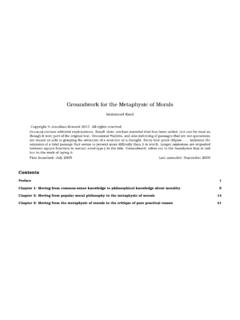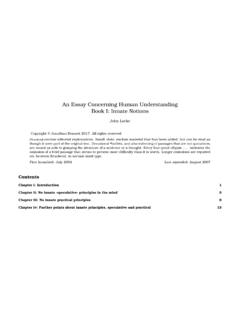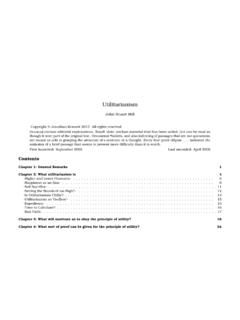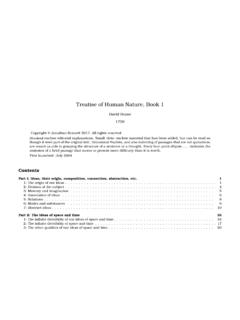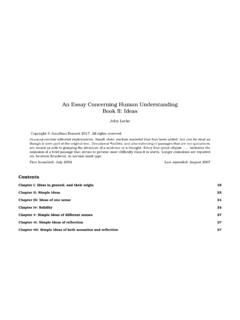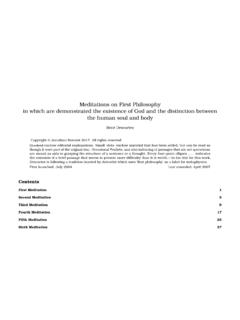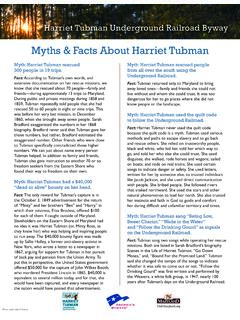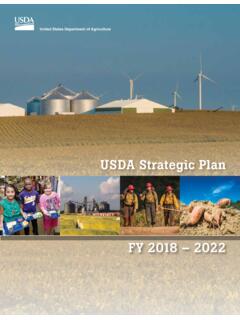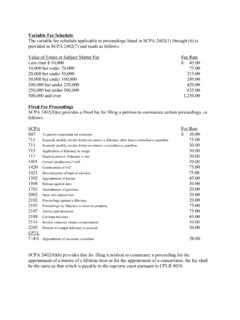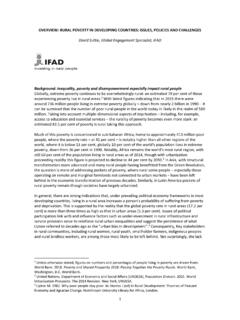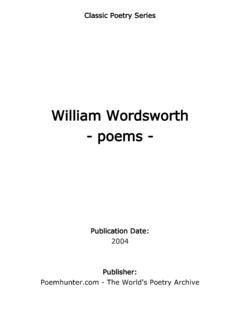Transcription of Wealth of Nations - Early Modern Texts
1 An Inquiry into the Nature and Causes of the Wealth of NationsAdam Smith1776 Copyright Jonathan Bennett 2017. All rights reserved[Brackets]enclose editorial explanations. Small dots enclose material that has been added, but can be read asthough it were part of the original text. Occasional bullets, and also indenting of passages that are not quotations,are meant as aids to grasping the structure of a sentence or a thought. Every four-point ellipsis .. indicates theomission of a brief passage that seems to present more difficulty than it is worth. Longer omissions are reportedbetween brackets in normal-sized type. Cross-headings inSMALL CAPITALS that are not in the original are markedby small dots . Each of them announces the start of a new topic; there is often no mark of where that topic launched: July 2016 The Wealth of NationsAdam SmithContentsIntroduction and plan of the work.
2 1 Book I. The causes of improvement in the productive powers of labour, and the order according to which its productis naturally distributed among the different ranks of people3 Chapter 1. The division of labour ..3 Chapter 2. The principle that gives rise to the division of labour ..6 Chapter 3. The division of labour is limited by the extent of the market ..8 Chapter 4. The origin and use of money ..10 Chapter 5. Commodities real price (in labour) and their nominal price (in money) ..12 Chapter 6. The component parts of the price of commodities ..18 Chapter 7. Commodities natural and market prices ..22 Chapter 8. The wages of labour ..26 Chapter 9. The profits of stock .. 37 Chapter 10. Wages and profit in the different employments of labour and stock.
3 43 Part 1. Inequalities arising from the nature of the employments themselves ..43 Part 2. Inequalities caused by the policy of Europe ..53 Chapter 11. The rent of land ..62 Part 1. The product of land that always provides rent .. 64 Part 2. The product of land that provides rent sometimes but not always .. 71 Part 3. Variations in the proportion between the respective values of the two sorts of product ..78 Book II. The nature, accumulation, and employment of stock94 Introduction .. 94 Chapter 1. The division of stock ..95 Chapter 2. Money, considered as a part of the society s general stock. The expense of maintaining the national capital. 99 Chapter 3. The accumulation of capital; productive and unproductive labour.
4 107 Chapter 4. Stock Lent at Interest .. 114 Chapter 5: The different uses of capital .. 117 Book III. The different progress of affluence in different nations124 Chapter 1: The natural progress of affluence .. 124 Chapter 2. The discouragement of agriculture in Europe after the fall of the Roman Empire .. 126 The Wealth of NationsAdam SmithChapter 3. The rise and progress of cities and towns after the fall of the Roman Empire .. 130 Chapter 4: How the commerce of the towns contributed to the improvement of the country .. 133 Book IV: Systems of political economy139 Introduction .. 139 Chapter 1: The principle of the commercial or mercantile system .. 139 Chapter 2: Restraints on importing from foreign countries goods that can be produced at home.
5 148 Chapter 3: Restraints on almost all imports from countries with which the trade balance is supposed to be disadvantageous155 Part 1: The unreasonableness of those restraints even on the principles of the commercial system .. 155 Part 2: The unreasonableness of those special restraints on other principles .. 157 Chapter 4: Drawbacks .. 162 Chapter 5: Bounties .. 163 Chapter 6: Treaties of commerce .. 167 Chapter 7: Colonies .. 169 Part 1. Motives for establishing new colonies .. 169 Part 2. Causes of the prosperity of new colonies .. 174 Part 3. Europe s advantages from the discovery of America and of a route to the East Indies around Africa .. 180 Chapter 8: Concluding discussion of the mercantile system.
6 186 Chapter 9: Agricultural systems of politicaleconomy,according to which the sole source of a country s Wealth is theproduct of its land .. 189 The Wealth of NationsAdam SmithGlossaryaccommodation:Smith often uses this word in a broadersense than we are familiar with, a sense in which someone s accommodation refers to all the comforts and convenienceshe enjoys, not merely the place where he :Selling something to someone outside the familyof its present : Pertaining to the absolute ownership of an estate (OED)arbitrary:It means dependent on individual human deci-sions . An arbitrary government is contrasted with one inwhich the rule of law is :Any practical activity that is governed by rules, involvestechniques, requires skill.
7 :Property and/or guaranteed income of a rector orvicar (higher in rank than a curate). bounty :A handout from the state to the exporter of certainsorts of :Sometimes used to cover horses, hogs, and sheep aswell as bovine livestock. Not :Carriers of sedans, hired especially in winter toenable the passenger to avoid walking in water and :On a few occasions Smith uses contempt of x tomean attitude of regarding x as negligible .creditable:Respectable, demand(er):A technical term of Smith s, ex-plained on page :A property is entailed if it must by law remain in thepossession of the family that now owns :This imprecise term covers: coach and horses,servants uniform, elegant cutlery and dishes, and so :Replaces Smith s manufactory paid:A tax is finally paid by the person who pays itwith :Mainly used in today s sense of free in giving ,but a few times in the older sense of noble-minded, magnan-imous, rich in positive emotions :Aptitude for a particular , revenue:In this version, private individuals haveincomes.
8 Smith usually says that they have :Work, the work of a farm :In Smith s usage, a skilled worker who is avail-able to be hired but is not anyone s permanent fixed-wageemployee, and is paid according to output rather than :In this work a magistrate is anyone with anofficial role in the enforcement of law; on page 180 theemperor Augustus is referred to as the magistrate .manufacturer:Smith quite often uses this in something likeour sense, though he often expresses that with the phrase master manufacturer . Sometimes the undecorated noun isused to refer to anyone whoworks inmanufacturing; thereis a striking example of this on page :Lowest on the social :When Smith mentions particular sums of moneyin the terminology of pounds , shillings and pence , thosewords are usually replaced by the conventional symbols,so that for example 13/6/8d means thirteen pounds sixThe Wealth of NationsAdam Smithshillings and eightpence ; 6/- means six shillings ; 8d means eightpence.
9 Parish:A town or village or neighbourhood that has its ownchurch. To come on the parish = to live in a workhouse, atpublic expense , always in wretched :Having to do with money; a worker s pecuniarywages are what he is paid in cash for his liberty:Smith regularly uses this phrase, as heexplains on page 22, to mean being free, so far as the law isconcerned, to practise any trade you choose .perpetuities:Legal arrangements under which estates cannever be sold or given :In this workprinceisn t a title and doesn t designatea rank; it stands for any ruler of a state, whether a king orqueen or duke or count :Smith often uses this word in a sense, once com-mon but now obsolete, in which principle means source , cause , driver , energiser , or the :Unwisely free in spending; the prodigal son doesnotmean the son who left home and then returned but theson who foolishly squandered all his money.
10 Projector:Someone who tries to start a new enterprise. Onpages 117 and 123 there are strong suggestions of someonewho rashly or foolishly tries certain:A rent stated as a fixed amount of money permonth, year, etc., rather than as a fixed proportion of somevariable quantity such as profitability of :Sometimes used in the now obsolete sense of recompense or repayment . The word is left untouchedin this version in case Smith means by it something morespecial than that. See alsofinally :The revolution Smith refers to on page??anda few other places is the sequence of events in1688inwhich James II (Roman catholic) was replaced by the DutchWilliam and Mary of Orange (protestant) as joint sovereignsof :As applied to societies: primitive.

